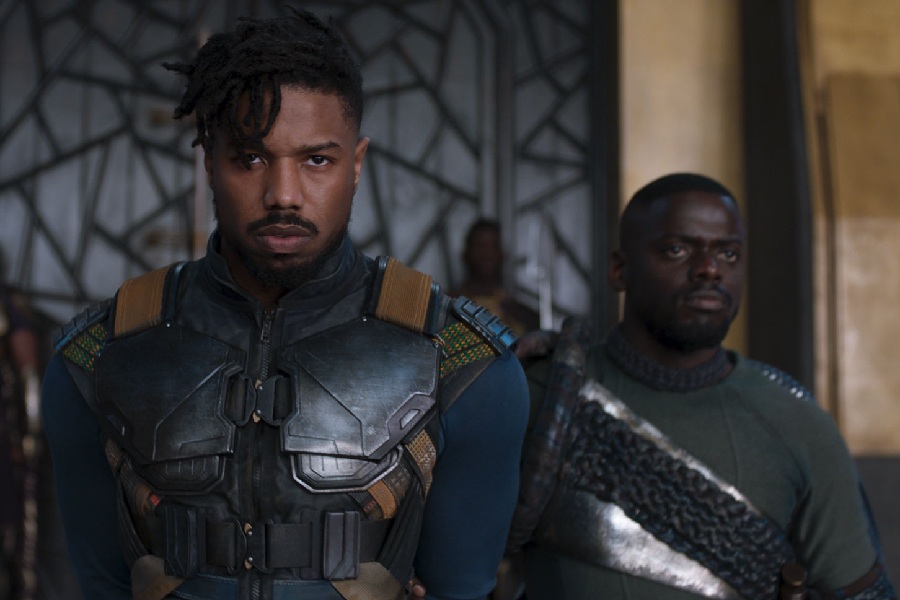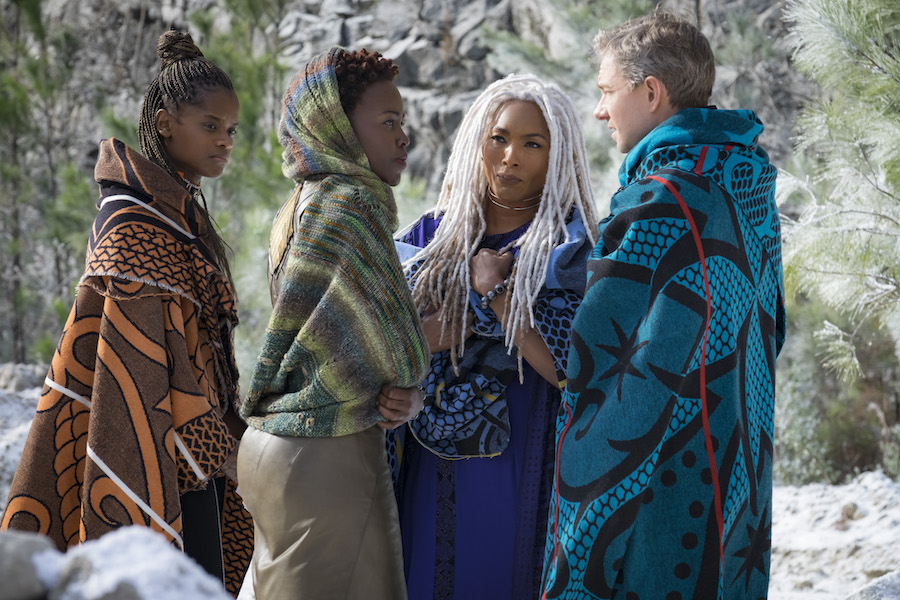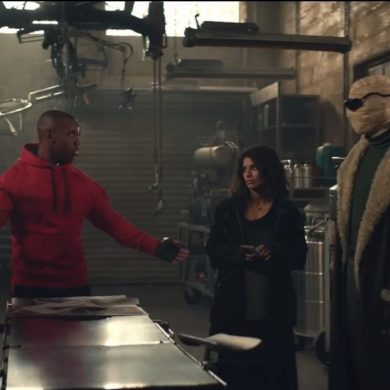Marvel Studios has never been a victim of circumstance or failing financially. Instead, it’s a company that’s implemented shrewd calculations when it comes to their films, which allows their products to be just entertaining enough to distract from their main goal: merchandising and profits. That may sounds a bit negative, but what initially started out that way has ever so slightly tipped the scales to the audience’s advantage. Sooner or later though, something was going to break the bank. Now, it’s finally here. Though it took 10 years, 17 movies and Three Phases to get to this point, Marvel has a film on their hands that has the ability to change the film landscape. Make no bones about it, Black Panther is King.
Starting out a week after the events of Civil
War, T’Challa (a commanding Chadwick Boseman) returns back home, for his coronation. He struggles with the prospect of becoming King, both in matching his father’s legacy and the burden that comes in leading his people into a new age. For while the rest of the world sees a third-world country, Wakanda is really an Afro-Futuristic wonderland shrouded by a mirage emanating force-field. Events dive deep into the rich culture on display, with barely a chance to catch breath. That’s good, because rarely does a film see a world and life rendered in such rich detail. Since this is a comic book movie, there’s more going on than is initially glimpsed on the surface. It’s here the film pulls away from its brethren, giving way to a story that’s equal parts Shakespeare and James Bond. If that doesn’t grab your attention, then there’s a large cast of known commodities (Angela Bassett, Forest Whitaker, Lupita N’yongo, Sterling K. Brown, Danai Gurira) to help stem the tide. There are the usual missteps that almost any Marvel film is saddled with these days. Shoe-horning in a Stan Lee cameo or combating pre-viz sequences drawn-up before a script’s finalized is almost a necessary evil, given how things turn out. To counteract this, there’s a fitfully inventive fight inside an underground casino akin to old Shaw Bros films, which is as far as one can get from the CGI messes of today. Another notable element is that of the music. Much has already been made of the Kendrick Lamar-produced soundtrack, yet the score deserves due attention too. Composer Ludwig Göransson fuses South African and Senegalese beats with a traditional symphony to produce a propulsive soundscape that is sure to stick with all who hear it.
There are the usual missteps that almost any Marvel film is saddled with these days. Shoe-horning in a Stan Lee cameo or combating pre-viz sequences drawn-up before a script’s finalized is almost a necessary evil, given how things turn out. To counteract this, there’s a fitfully inventive fight inside an underground casino akin to old Shaw Bros films, which is as far as one can get from the CGI messes of today. Another notable element is that of the music. Much has already been made of the Kendrick Lamar-produced soundtrack, yet the score deserves due attention too. Composer Ludwig Göransson fuses South African and Senegalese beats with a traditional symphony to produce a propulsive soundscape that is sure to stick with all who hear it.
Also helping is the addition of a villain who not only comes fully formed, but with a backstory and agenda that’s compelling. Everything in Erik “Killmonger” Steven’s (a scintillating Michael B. Jordan) life has lead him to this place. Black Panther introduces him early, instantly lighting a fuse, but it take it’s time before allowing him to erupt. A dangerous combination of intelligence and menace (ritual scars cover his body for every life he’s taken) it’s no surprise why Jordan wanted the role. Adding to the mix is that Killmonger’s not entirely wrong in his ideology and wants. It’s the execution and arrogance of those desires that puts him in direct contrast to T’Challa. Two sides of the same coin, separated by class and circumstance. Moonlight proved a film about representation (in many forms) could easily gobble up critical acclaim. Get Out proved that it could be commercially viable. Black Panther proves that tent-pole blockbusters built upon on that backing could reach and move a large multitude of people, regardless of background while also breaking records before it’s actually released (a fact that A Wrinkle In Time hopes to cement next month). It’s difficult to notice or feel a seismic shift when it’s occurring, but here, in this moment, take notice, because this is when things change for the good.
Moonlight proved a film about representation (in many forms) could easily gobble up critical acclaim. Get Out proved that it could be commercially viable. Black Panther proves that tent-pole blockbusters built upon on that backing could reach and move a large multitude of people, regardless of background while also breaking records before it’s actually released (a fact that A Wrinkle In Time hopes to cement next month). It’s difficult to notice or feel a seismic shift when it’s occurring, but here, in this moment, take notice, because this is when things change for the good.
For almost everything that works, praise should start and end with director/co-writer Ryan Coogler, which isn’t to discount anyone else’s contribution, just to highlight how integral his is to the overall success. He never asks for special consideration or cuts any corners here. He places a focus on cultural identity and ownership of marginalized views, without caring if people want or need to see them. That millions are on-board is a testament to his craft. He’s made it work when stapling it to a true story (Fruitvale Station) and the ultimate underdog story (Creed), so it’s application to a superhero film (especially one of color) is the most natural fit ever. Black Panther may not be the first black superhero movie, but it is the first to want to engage in a conversation with the audience, while also giving them explosions both metaphorical and literal, that they deserve. Special appreciation has to be thrown to Marvel Studios and President Kevin Feige, concerning the handling of this third phase in the creative cycle. The films put out in the last year have gotten exponentially better, partially due to the hiring of directors who not only have a strong singular voice, but are able to extend that voice to the story itself. Doing so allows emphasis on many of the stories to stand by themselves, or at least within their own framework. While there is a larger game being played, in terms of finances and the “team-up” pictures, it bodes well for the future. If more films like Black Panther get made as a result, everyone wins.
Special appreciation has to be thrown to Marvel Studios and President Kevin Feige, concerning the handling of this third phase in the creative cycle. The films put out in the last year have gotten exponentially better, partially due to the hiring of directors who not only have a strong singular voice, but are able to extend that voice to the story itself. Doing so allows emphasis on many of the stories to stand by themselves, or at least within their own framework. While there is a larger game being played, in terms of finances and the “team-up” pictures, it bodes well for the future. If more films like Black Panther get made as a result, everyone wins.
To say this is the best Marvel movie yet, is easy. To say this is the most complete Marvel movie, is easy. Even saying this is the most important Marvel movie, is easy too. Yet Black Panther never takes the easy route. It takes it’s time setting up and building a world where legacy, tradition, loyalty and family rule. What’s more, it’s a Marvel film that not only is able to stand on it’s own, it’s one that’s all the better because it.



